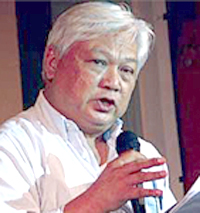Thais have more fraternal feelings toward their Shan cousins when they are living outside the border than after they have arrived in droves following massive forced relocation campaigns which displaced hundreds of thousands of them twenty years earlier, according to Dr Amporn Jirattikorn, presenting her paper at Chiangmai University this morning.
 On the one hand, academics are saying peoples of the Tai family: Tai Leu, Tai Dam, Ahom, Shan etc outside Thailand are “siblings”. Sao Yawdserk and the Shan State Army (SSA) are being applauded by the media and celebrities like Song for Life singer Ad Carabao, who said, “It is a struggle of people who are close to us, who are our brothers. We must help them. I’m helping them with my songs.”
On the one hand, academics are saying peoples of the Tai family: Tai Leu, Tai Dam, Ahom, Shan etc outside Thailand are “siblings”. Sao Yawdserk and the Shan State Army (SSA) are being applauded by the media and celebrities like Song for Life singer Ad Carabao, who said, “It is a struggle of people who are close to us, who are our brothers. We must help them. I’m helping them with my songs.”
Ad accordingly produced Mai Tawng Rawng Hai (No need to cry) album dedicated to the Shans and their struggle.
There are also writers like Nipatporn Pengkaew who wrote, “Shans fight Burmese” about the Shan State Army.
On the other hand, the huge influx of Shans in Thailand has generated feelings of what she terms “mythical nationalism” being under threat, even though Shans, as linguistic cousins, speak better Thai than others except for Laotians, another cousin.
“They are being viewed as criminals, drug traffickers and prostitutes,” She said. But the Thais are forgetting that Shans (a small number of them) are only catering to the Thai demand for drugs. “Also in some ways, Shan women seem to be more appealing to Thai men.”
The result was that, among the migrants, HIV/AIDS prevalence is the highest among Shans. Also some 10% of those imprisoned in Thailand on drug offenses are believed to be Shans.
“The Thai perception”, she concluded, “seems to be Shans are brothers as long as they live in another house.”
The natural outcome of it is that Shans become losers at both ends, both in Burma and their Promised Land: Thailand.
Nevertheless, Thailand is still where people coming from Burma are trying to build “a home away from home,” maintains another presenter Arjarn Siriporn Somboonboorana of Valailak University, Nakhon Srithammarat.
Dr Chayan Vaddhanaphuti, head of the Faculty of Social Sciences’ Center for Ethnic Studies and Development (CESD), during his closing remarks, suggested. “Maybe it’s in keeping with the Thai saying Mee Ngern Me Thong Nub pen Nawng pen Pi (Only those who have silver and gold are counted as brothers and sisters)”
Other presenters include Mukdawan Sakboon with “Cards, drugs, border politics: redefining citizenship at Thailand’s northern highland” and Micah Morton and Pannadda Boonyasaranai with “Mida”: Akha Engagements with popular Thai culture.


